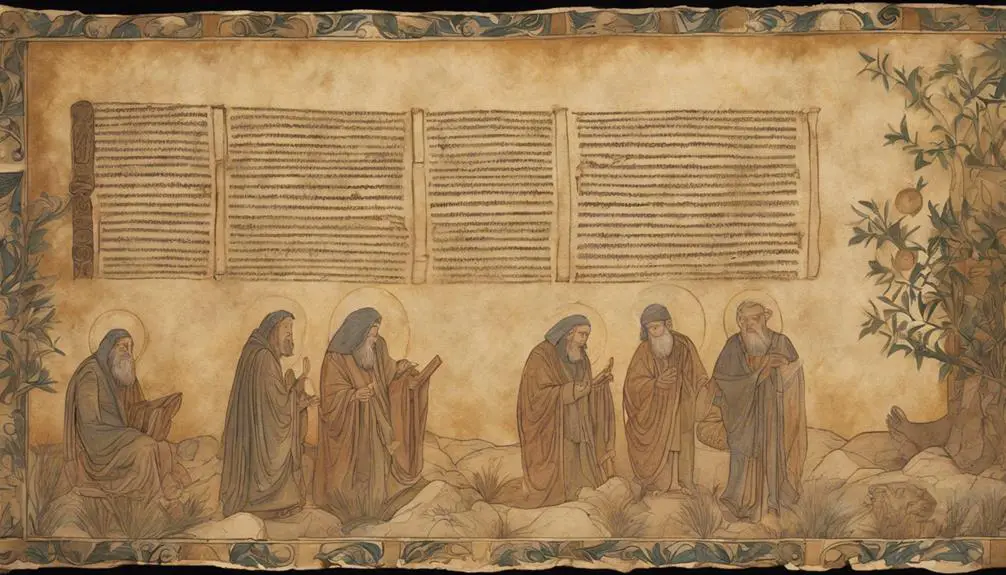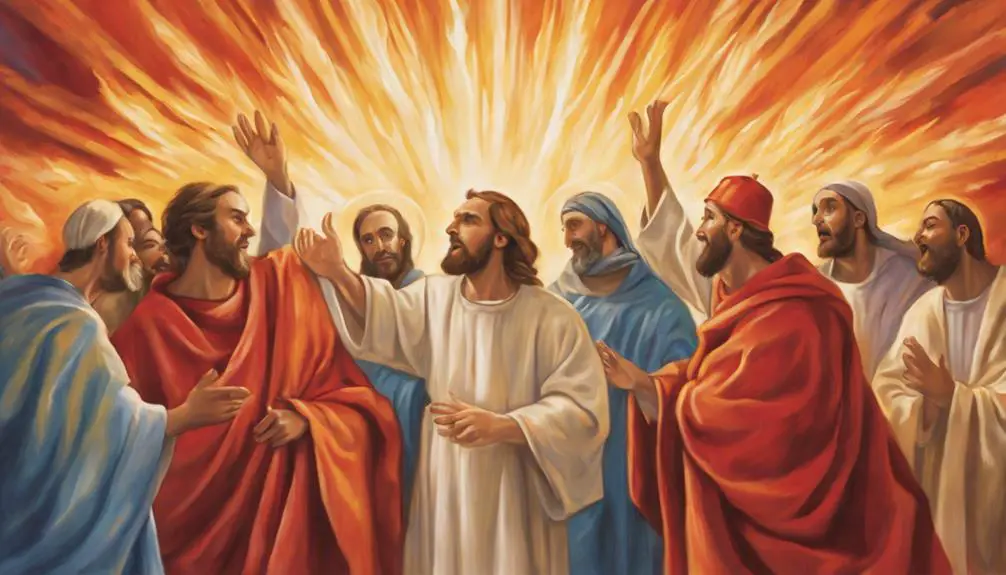Learn the surprising origins of the Holy Ghost in the Bible and uncover its evolving presence from Genesis to Revelation.

When Was the Holy Ghost First Mentioned in the Bible
In the grand tapestry of biblical texts, the first brush of the Holy Spirit's presence dances across the waters of creation in Genesis.
You've likely encountered the Spirit's presence woven through the narratives of the Old Testament, subtly shifting before emerging more prominently in the New Testament.
The journey from a whisper in Genesis to a roaring wind in Acts marks a fascinating evolution.
You'll find that understanding when the Holy Ghost is first mentioned not only sheds light on its role but also invites you to explore deeper into the dynamic nature of the Spirit throughout biblical history.
Key Takeaways
- The Holy Ghost, or Holy Spirit, is first mentioned in Genesis as a part of the creation narrative.
- Old Testament references depict the Spirit as a creative force and source of wisdom.
- The concept of the Holy Spirit evolves in the New Testament, emphasizing its role as a personal guide and supporter for believers.
- The arrival of the Holy Spirit in Acts marks its empowering presence among the apostles and the early Christian Church's foundation.
The Spirit in Genesis

In the book of Genesis, the Spirit of God is first introduced as moving over the waters of the earth, marking the Holy Ghost's initial presence in the Bible. This imagery isn't just poetic but is laden with profound meaning. The term 'moving' or 'hovering' as some translations put it, carries the connotation of a careful, nurturing presence, almost like a bird hovering over its nest. It's this Spirit's hovering that signifies an attentive, guiding force at the dawn of creation.
Diving deeper, the phrase 'Spirit of God' in this context is synonymous with 'Creation breath.' It suggests that the Holy Ghost wasn't a passive observer but an active participant in the creation process. This notion of the Spirit as a breath is crucial because, in Hebrew thought, breath is the essence of life. Therefore, the Spirit's involvement in creation is tantamount to imbuing the cosmos with life itself. This is a foundational concept that underscores the Spirit's vital role not just in the act of creation but in the sustenance and continuation of life.
Moreover, the introduction of the Holy Ghost in such an elemental role at the very beginning of the Bible sets the stage for its continuous presence and action throughout the sacred text. It indicates that the Holy Spirit isn't a peripheral character but a central figure in the divine narrative, interwoven into the fabric of God's interaction with the world.
Understanding this initial mention is crucial for comprehending the Holy Ghost's character and role. It's not merely an abstract force but a person of the Trinity, intimately involved in the cosmos's life and breath from the very start.
Old Testament References

Throughout the Old Testament, references to the Holy Ghost reveal its profound and multifaceted involvement in human history and divine interaction. This presence isn't merely a backdrop but actively participates in guiding, inspiring, and even empowering individuals and groups towards fulfilling God's will. The Old Testament elucidates this role in various narratives and writings, offering a rich tapestry of the Holy Ghost's engagement with humanity.
Key aspects of the Holy Ghost's influence include:
- Psalms inspiration: The Psalms, a collection of poetic hymns, often reflect the inspiration derived from the Holy Ghost. They articulate deep spiritual truths and emotions, ranging from despair to exultation, and frequently acknowledge the Spirit's role in inspiring these expressions.
- Prophetic guidance: Prophets in the Old Testament frequently operated under the guidance of the Holy Ghost. This divine influence enabled them to deliver messages of warning, hope, and instruction to the people of Israel. Their prophecies, which often contained foretellings of future events, were a direct result of the Holy Ghost's revelation.
- Creation and wisdom: Beyond the more explicit roles, the Holy Ghost is also seen as a creative force and a source of wisdom. Its involvement in the creation narratives and in bestowing wisdom upon leaders and craftsmen underscores its integral role in both the material and spiritual realms.
Analyzing these references, it's clear that the Holy Ghost's presence in the Old Testament isn't an abstract concept but a vital and dynamic force. Its actions and guidance are pivotal to understanding the unfolding of divine plans and the development of a deep, personal relationship with God among the believers of that time.
Transition in the Gospels

As we delve into the Gospels, the role of the Holy Ghost undergoes a significant transformation, marking a pivotal shift in its interaction with humanity. This period is crucial for understanding the evolving nature of the Holy Ghost, moving from sporadic Old Testament appearances to a more defined and accessible presence.
Within the narrative of the Gospels, you'll notice an anticipation building up, preluding to a major event in the history of Christianity: the Pentecost. The significance of Pentecost can't be overstated, as it represents the moment the Holy Ghost descends upon the apostles, empowering them for their mission. However, this event's full exploration belongs to a later discussion.
In the meantime, the Gospels introduce us to the concept of the Paraclete, a term that signifies an advocate or helper, which is how Jesus describes the Holy Ghost. This introduction is pivotal, signaling a transition from the Holy Ghost being a divine force or presence to becoming an intimate guide and support for believers. Jesus' conversations, especially noted in John's Gospel, highlight this shift, promising the Holy Ghost to His followers as a permanent indwelling presence that would lead, teach, and remind them of His teachings.
This period in the Gospels sets the stage for a deeper relationship between humanity and the divine. It's a time of preparation, where the followers of Jesus are gradually introduced to the idea of the Holy Ghost not just as a power from on high, but as a personal guide and advocate, ready to empower and lead the church in the aftermath of Jesus' ascension.
Acts: The Holy Spirit Arrives

The book of Acts chronicles a pivotal moment when the Holy Spirit descends upon the apostles, marking a new era in the relationship between humanity and the divine. This event, known as Pentecost, signifies not just the fulfillment of Jesus' promise but also the beginning of a transformative movement in the early Christian community. The significance of Pentecost and the apostolic empowerment that followed can't be overstated. Here's why:
- Pentecost's Significance: It represents the birth of the Christian Church. On this day, the Holy Spirit empowered the apostles to speak in tongues, a sign of divine presence and approval. This miraculous event attracted thousands, leading to the rapid spread of Christianity.
- Apostolic Empowerment: The Holy Spirit's arrival endowed the apostles with powers and abilities beyond their natural capacities. They could perform miracles, heal the sick, and more importantly, preach the gospel with boldness and authority.
- Universal Message: The Holy Spirit's descent at Pentecost underscored the universal nature of Christianity. The apostles spoke in various languages, demonstrating that the message of Jesus was for all humanity, not confined to a single ethnic group or nationality.
Through the lens of Acts, we see the Holy Spirit as a catalyst for change, empowering the apostles to lead a movement that would transform the world. The arrival of the Holy Spirit signifies a transition from a promise to a living reality, where the divine actively participates in the unfolding story of humanity's redemption.
Letters of Paul

Building on the momentum of the Holy Spirit's arrival in Acts, Paul's letters further explore the depth of Christian doctrine and its implications for believers' lives. You'll find that Paul's writings are rich with references to the Holy Spirit, emphasizing His role not only in the individual believer's life but also within the collective church. Paul's authority, as an apostle, lends significant weight to his teachings on the Holy Spirit, particularly concerning the distribution and operation of spiritual gifts.
Paul's letters elaborate on the Holy Spirit's function as a guide, teacher, and source of spiritual gifts, including wisdom, knowledge, faith, healing, prophecy, discernment, speaking in tongues, and interpretation of tongues. These gifts, as outlined by Paul, are intended for the edification of the church and the furtherance of its mission. Paul stresses that while the gifts are varied, the Holy Spirit is the singular source, promoting unity within diversity.
Moreover, Paul's discussions on the Holy Spirit challenge believers to live lives that are in step with the Spirit, producing fruit that evidences their faith. Love, joy, peace, patience, kindness, goodness, faithfulness, gentleness, and self-control are marked as the fruits of a Spirit-led life. Through Paul's lens, the Holy Spirit isn't merely a force or power but a personal presence that transforms believers from the inside out, enabling them to live out their faith authentically.
In essence, Paul's letters don't just affirm the existence of the Holy Spirit; they delve into how His presence fundamentally changes how believers live, interact, and serve within the body of Christ.
The Holy Spirit in Revelation

In Revelation, the Holy Spirit's presence and influence permeate the narrative, offering profound insights into the culmination of God's plan for humanity and the church. You'll find that the Holy Spirit plays a pivotal role, not just as a guide, but as a revealer of mysteries through symbolic imagery and its apocalyptic role.
The Holy Spirit in Revelation is portrayed through various symbols and actions, emphasizing its critical function in the unfolding of apocalyptic events. Here are key points to consider:
- Symbolic imagery: The Holy Spirit is often represented through symbols, such as seven lamps of fire burning before the throne, which are the seven Spirits of God. This imagery underscores the Holy Spirit's divine omnipresence and omniscience, reflecting its integral role in God's revelation to humankind.
- Guidance to the churches: Through John's visions, the Holy Spirit sends messages to the seven churches, offering both commendation and correction. This demonstrates the Holy Spirit's role in nurturing, guiding, and refining the church in preparation for the end times.
- Apocalyptic role: The Holy Spirit unveils the future, revealing the final judgment and the ultimate victory of good over evil. This apocalyptic vision provides hope and a call to perseverance for believers, highlighting the Holy Spirit's role in prophesying and affirming God's sovereign control over history.
Understanding the Holy Spirit's role in Revelation helps you grasp the depth of its involvement in the narrative's symbolic and apocalyptic dimensions. This insight offers a richer comprehension of the Holy Spirit's continuous action in guiding the church through its challenges and triumphs, ultimately leading to the fulfillment of God's redemptive plan.
Frequently Asked Questions
How Do Different Translations of the Bible Vary in Their Depiction of the Holy Ghost?
Different Bible translations vary in their depiction of the Holy Ghost due to translation methodologies and linguistic variations.
You'll find that some versions emphasize the spirit's divinity, while others focus on its guidance.
This discrepancy arises from how translators interpret ancient texts and the linguistic choices they make to convey those meanings in contemporary language.
Analyzing these versions can offer you a deeper understanding of the Holy Ghost's role across Christian traditions.
What Are the Theological Implications of the Holy Ghost's Role in Non-Canonical Texts?
In exploring the Holy Ghost's role in non-canonical texts, you're diving deep into theological rabbit holes.
Gnostic perspectives and Apocryphal narratives offer a unique lens, painting the Holy Ghost not just as a figure of worship but as a complex, multifaceted entity.
These texts challenge traditional doctrines, proposing that the Holy Ghost's influence extends beyond canonical boundaries, sparking debates on divine nature and the intricacies of spiritual realms.
How Has the Concept of the Holy Ghost Evolved in Christian Theology Outside of Biblical Texts?
You're exploring how the concept of the Holy Ghost has evolved in Christian theology beyond the Bible. This journey reveals a rich tapestry of spiritual symbolism and divine manifestations.
Over time, theologians have delved into the Holy Ghost's role, transforming it into a symbol of God's presence and action in the world. This evolution reflects a deepening understanding of the Holy Ghost as an integral part of the divine, guiding and empowering believers.
What Are the Major Differences in Understanding the Holy Ghost Among Various Christian Denominations?
Imagine navigating a vast ocean, where each wave represents a denomination's view on the Holy Ghost. You'll find the waters differ greatly.
At the heart, Pentecost significance varies; for some, it's a dramatic outpouring of spiritual gifts, while others see it as a symbolic event.
Baptismal practices also diverge, with tongues of fire in some traditions and a gentle dove in others, reflecting deep-rooted theological nuances in understanding the Holy Ghost's role.
How Do Other Religions and Belief Systems Outside of Christianity Perceive the Concept of the Holy Ghost or Similar Entities?
You're diving into how religions outside Christianity view the Holy Ghost or similar entities.
In Hinduism, parallels exist with concepts like Brahman, embodying a universal spirit.
The Islamic perspective differs; it doesn't recognize the Holy Ghost as Christianity does but acknowledges the Holy Spirit in the context of divine inspiration.
Analyzing these views, you'll find unique interpretations that reflect each religion's core beliefs and theological frameworks, offering a rich tapestry of spiritual understanding.
Conclusion
In your journey through the scriptures,
you've traced the Holy Spirit's presence from a whisper in Genesis to a roar in Revelation.
Like a river that starts as a trickle and grows into a mighty force,
the Spirit's role and recognition swell across the biblical narrative.
Your exploration has revealed the Holy Spirit as a dynamic, unifying presence,
weaving through the tapestry of the Bible,
enriching its message and empowering its followers with divine guidance and strength.



Sign up